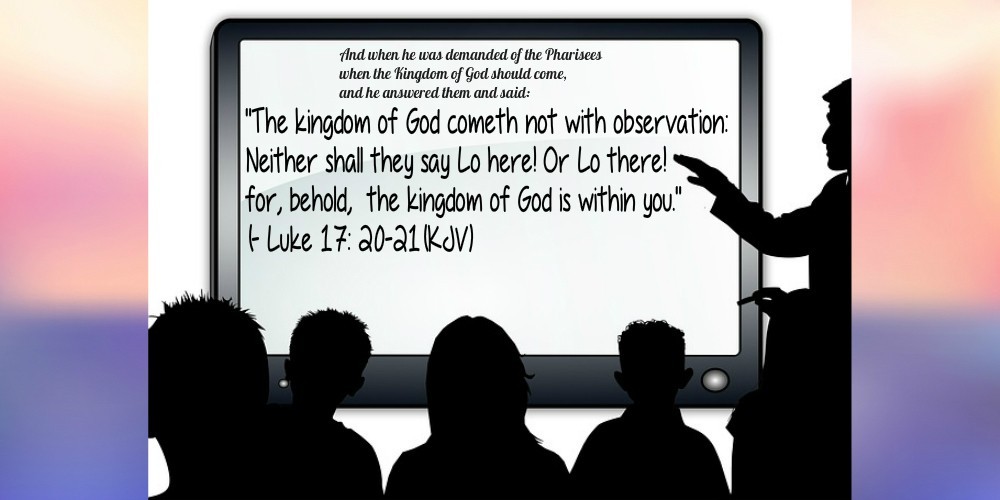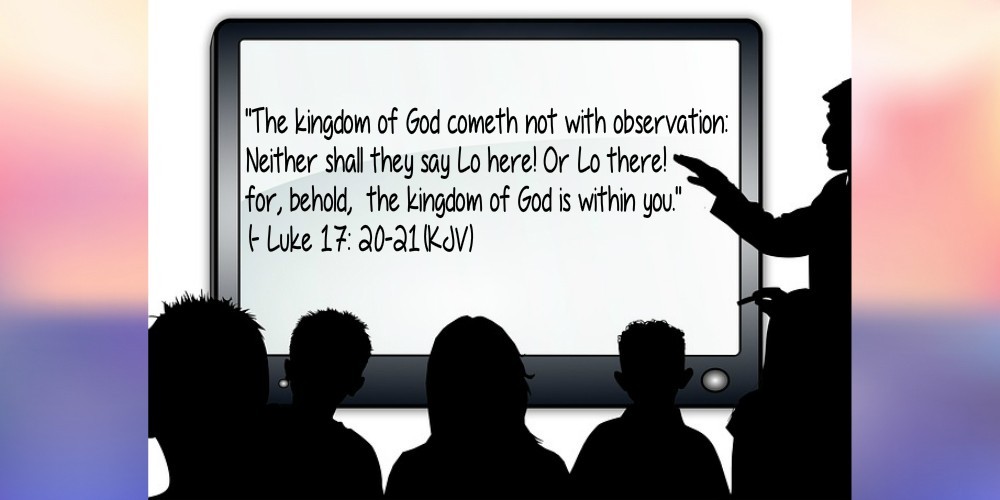How to Seek the Kingdom of God? Is it within you or outside you? In this post, we will look at the topic of “Was Jesus a mystic?” A common idea within the New Age movement is the idea that Jesus was a mystic teaching us the inner path of enlightenment. This is an idea that is taught by people like Deepak Chopra and Eckhart Tolle. And as an idea, I used to entertain. And this idea comes primarily from a verse found in Luke chapter 17, which reads:
How to Seek the Kingdom of God According to Mysticism
People who have been involved in new spirituality use this verse and try to infer from it that the kingdom of God is actually an internal spiritual reality waiting to be accessed by us through enlightenment, ego death, and self-discovery. When we transcend our egos, we enter into the “I am presence.” That is within each one of us at the core of our beings. And so the kingdom of God is not something that is external to us. Still, it’s something we come to the realization of through contemplation, meditation, and self-surrender, where we enter into unity consciousness. So the kingdom of God is a level of being that is already unified with God, which we arrive at through ego death and a shift in consciousness. And so, what we’re going to do in this post is look at the correct interpretation of this verse along with five arguments that this verse cannot possibly be interpreted in a mystical sense. And then there is another argument that Jesus could not have been a mystic. So before jumping to the idea that this must be a reference to mysticism or to some kind of Eastern concept of enlightenment, we should first survey what theologians and biblical scholars say about this verse.
How to Seek the Kingdom of God According to Christian
So the verse above, in a Christian context, is referring to God’s spiritual Kingdom. That is being established within the hearts of believers here on earth. God’s kingdom will not be seen in some physical buildings or a specific geographical location. It’s established in the hearts and spirits of those born again in his son. When you actively believe in Jesus Christ as the Lord and Savior and believe in your heart that he died for your sins and God raised Him from the dead, his spirit bears itself in you. So his kingdom is here on earth concerning Christians being vessels for the indwelling of the Holy Spirit, which is how God’s kingdom is manifesting itself in the world right now. So this verse means that God’s kingdom will be manifested on earth in the hearts of believers via the Holy Spirit. Now let’s look at five different reasons why this verse could not possibly refer to an internal reality waiting to be discovered by us or something along these lines. The first argument for why Jesus was not saying that the kingdom of God is already within everybody is that he named the people who said this as the children of Satan.
He Also Called the Pharisees As:
– blind guides
– fools
– full of dead man’s bones and all uncleanness
– serpents
– generation of vipers
– hypocrites
– damned to Hell
– children of the devil
He asked them: “How can you escape the damnation of hell?” He even said that their father was the devil. So Jesus is apparently not saying that the kingdom of God is within the same people whom he called blind children of Satan who are damned to hell. So we can know that Jesus didn’t mean to say the kingdom of God is already within everybody if he specifically told the Pharisees that the kingdom of God wasn’t within them. In fact, we can expand upon this point, which leads to the second argument, which is that the entire New Testament and, in particular, the whole Bible is premised on the idea that the kingdom of God is not already within us. That’s one of the reasons Christ died is so that we could be reconciled back to God from whom we are now separated through sin.
Outside of Faith in Jesus, the Bible Says We Are:
– children of wrath
– enemies of God
– children of the devil
– of the spirit of the antichrist
While this may be offensive to some people, it’s important to note because the Bible says very clearly that the kingdom of God is not within us. In fact, it says explicitly that we are separated from God. And, of course, we get reconciled back to God through faith in Jesus Christ and not through works of self-discovery or works of one’s own righteousness. And so Jesus is apparently not saying that the kingdom of God is already within everybody waiting to be realized.
But you may say that the kingdom of God was still within them in some way. It just wasn’t activated within them because they hadn’t experienced ego death and hadn’t tapped into God’s inner presence. So Jesus called them children of the devil and blind because they lacked self-awareness and they lacked the vision to see that the presence of God was already within them. And this is not possible because when we look at this verse, Jesus is speaking about the kingdom of God as something that hadn’t even arrived yet when he said this. An argument could be made that the kingdom of God wasn’t within anybody at that time other than Jesus. And this is why he spoke in the future tense about something that would arrive in the future.
Let’s See Once More How It Was Said About the Kingdom of God
Notice how it says, “Neither shall they say”? Meaning “they will not in the future” say this about the kingdom of God. This is future tense here. And the word for cometh in Greek is the same word used for coming, which is why most English translations say that the kingdom of God is not coming in the future with observation. If Jesus wanted to say that the kingdom of God was already within them, he would have been speaking in the present tense. If he were speaking in the present tense about something that was already within them, he would have said something like this. The kingdom of God has not (or does not) come in a way that can be observed. Do not say, “Look, here it is” or “There it is,” Behold the kingdom of God is(already) within you.
This is how the verse would read if Jesus were trying to communicate that God’s kingdom is already here, present as an internal reality of some sort. They asked him when the kingdom of God would come in the future, and Jesus answered them, telling them how it would come and how it would be established in the future, which means that it couldn’t have already been within them. And as we know from the previous two points, Jesus certainly wasn’t saying it was already within them. So Jesus could not be referring to an internal state of being already within everybody waiting to be realized if, in this narrative, he is speaking of it in something that hasn’t even arrived yet. And so this means, of course, that it couldn’t have already been within the Pharisees.
A Fourth Argument Against the Mystical Interpretation
A fourth argument against the mystical interpretation of this verse is that this probably isn’t even the best translation of this verse. The New Testament was originally written in Greek, and if we go back to the Greek word for within, it is called “Entos.” But “Entos” doesn’t just mean within. It can also mean among or in the midst of. So while this verse can be translated into:
Something that I wish I knew as a New Ager trying to interpret this verse and struggling with what did Jesus really mean. Here is the fact that most English translations don’t even say that the kingdom of God is within you. Here’s a list of the English translations that don’t read that the kingdom of God is within you. The ESV, the NASB, the NIV, the NRSV, the NLT, the RSV, and the CEB, along with 20 other English translations. So just as well as someone can say, Jesus said: “The kingdom of God is within you.” – Luke 17:21(KJV). One could say that he didn’t even say that. And they’d be just as correct, if not more correct if we’re going to go with what most Bibles and literary scholars say about this verse. So it seems to me like the mystic has a dilemma here. If you want to give a mystical interpretation of this verse, he has to deal with the fact that he can only choose one-third of the possible translations of this verse. And he has to cherry-pick from the minority of Bible translations. In contrast, a Christian can pick up an ESV or a KJV, and a hundred percent of possible translations are compatible with a Christian worldview.
So the fourth argument is basically that Jesus probably didn’t even say this and that the verse is better translated to among you or in the midst of you, which is why most translations don’t say “the kingdom of God is within you.”
Other Verses in the Bible Warn Against These Kinds of Interpretations
A fifth argument is that other Bible verses warn against these interpretations of the Gospels and of Jesus specifically. So this couldn’t possibly be a reference to mysticism.
Paul says: 
And then about these people who teach these kinds of Gospels, he says: 
Paul also says: 
So in these verses, Paul is saying that any gospel or version of Jesus other than the one he is preaching is false. And that those who preach it are false apostles. And to understand what Paul’s gospel is, all we really have to do is read Paul’s epistles.
Here are just a couple of verses rapid summary of what Paul’s gospel is:
So Paul’s gospel is really simple we are saved by grace through faith in Jesus Christ and not through works of self-development or righteousness.
Paul Actually Saw Jesus Himself
Now the reason why this is a knockdown argument against the mystical interpretation of this verse is that Paul actually saw Jesus himself. Not only did he see Jesus and receive this information from Jesus directly, but he also spent two weeks with Jesus’ disciple Peter and Jesus’ brother James. And he also checked his gospel against the Gospels of Peter, James, and John to ensure they were on the same page and to ensure he wasn’t quoted running in vain. And as he says, they added nothing to me. So Paul saw Jesus three years after his crucifixion and was taught directly by Jesus spent two weeks with Jesus’ disciples and brother to talk and make sure they were on the same page. And then he went back to double-check over a decade later and found out he was still preaching the exact same Gospel. As Jesus’ direct disciple and his brother, both of whom were eyewitnesses to Jesus’ ministry. So Paul is undoubtedly the ultimate authority on what the gospel actually is. And he warns against false interpretations of the gospel and false versions of Jesus specifically. He says that anyone who teaches anything contrary to what he teaches is a false apostle teaching lies.
So the fifth argument is that this verse could not possibly be a reference to mysticism if it contradicted and was warned up specifically by Paul, who was taught directly by Jesus and checked his material against his disciple and his brother. Both of whom were taught directly by Jesus. So so far, we’ve looked at the correct interpretation of the scripture. We’ve looked at five different arguments that this could not possibly be a reference to mysticism or some kind of internal path of enlightenment.
Jesus Was a Monotheistic Jew
Now we’re going to look at one additional argument: that Jesus was not a mystic. He was a monotheistic Jew who believed in the God of the Old Testament. Now there are many ways to establish that Jesus was not a mystic. But what we’re going to look at here, in particular, is the Jewishness of Jesus. Jesus believed in the authority and divine inspiration of the Torah and the scriptures of the Jewish prophets. In fact, in Mark 7, he explicitly calls Moses’s commandments in the Torah the Word of God.
So how could Jesus be a mystic if he believes that the Old Testament and the Torah is the literal word of God? We often forget that Jesus was a practice than a Jew. He kept all of the Jewish high fees days, such as the feast of Passover (Luke 2: 41-42), the Feast of Tabernacles (John 10:22), and the Feast of Dedication (John 10:22). He even claimed to be the “Lord of the Sabbath, (Matthew 12:28)”.
This is someone that believed in and preached the Old Testament. He grew up as a Jew in the synagogue. He even taught in the synagogue from the scriptures. He believed that the Scriptures could not be broken and that they were the literal word of God. Jesus was a Jew. He was not a mystic. This is why his disciples called him “Rabbi,” which means Jewish teacher, over a dozen times in Scripture.
And the final point on the Jewishness of Jesus, which is a knockdown argument against him being a mystic, was that he claimed explicitly that his father God was Yahweh, the God of the Old Testament, whom the Pharisees claimed to believe in. As he says in John 8 verse 54:

So Jesus claims specifically here that his father was the god of the Pharisees and the Pharisees were, of course, Jewish. So how could Jesus be a mystic if he claimed that his father was Yahweh, the monotheistic deity of the Old Testament? So to summarize this point, Jesus was a practicing Jew who believed that the Old Testament was the literal word of God. He claimed that his father was the god of the Pharisees, the God of the Old Testament.
Conclusion on How to Seek the Kingdom of God?
So we’ve looked at how the correct interpretation of this verse is talking about God’s spiritual Kingdom established within the hearts of believers. We’ve looked at how Jesus also called the Pharisees children of Satan, which means that the kingdom of God couldn’t have already been within them. We’ve looked at how the Bible and the New Testament are premised on the idea that the kingdom of God is not within us. We’ve looked at how in this narrative, Jesus is referring to the kingdom of God as something that hadn’t even arrived yet. Which means that he couldn’t have been saying it’s already within us. We’ve looked at how this probably isn’t even the best translation of this first and how most translations of this first actually don’t say that the kingdom of God is within you. We’ve looked at how Paul, who was taught by Jesus and checked his material against eyewitnesses of Jesus’s ministry, warned against false versions of Jesus and false Gospels. Explicitly contrary to the one that he taught. And we’ve looked at how Jesus was a monotheistic Jew, a practicing Jew who worshiped and claimed to be sent by the God of the Old Testament, Yahweh.
And for those who have read this far who might have come into this blog thinking that Jesus was a mystic or something like this, I would encourage these people to go back and read the Gospels. I remember the first time I started listening to the Gospels after becoming a Christian; I was utterly blown away by how naive and false my ideas of Jesus were. Like they were not based on anything that was actually found in Scripture. It was just me repeating and recycling versions of Jesus that I had heard about from Mooji, Deepak Chopra, or other people. It wasn’t actually based on anything Jesus said, did, or believed. In fact, everything Jesus said I didn’t believe seemed to contradict what I thought I knew about him. And so, while an Eastern pantheistic interpretation of reality might seem intuitive or attractive to some people, it does not and cannot apply to the person of Jesus. In fact, it’s contradicted by the person of Jesus. If Jesus is who he claimed to be, then mysticism and panentheism are false. And I would encourage you again to go back and read the Gospels, read the New Testament, and allow the words of Jesus and many of the scriptures to speak for themselves. So thanks for reading, and I’ll see you next time.


